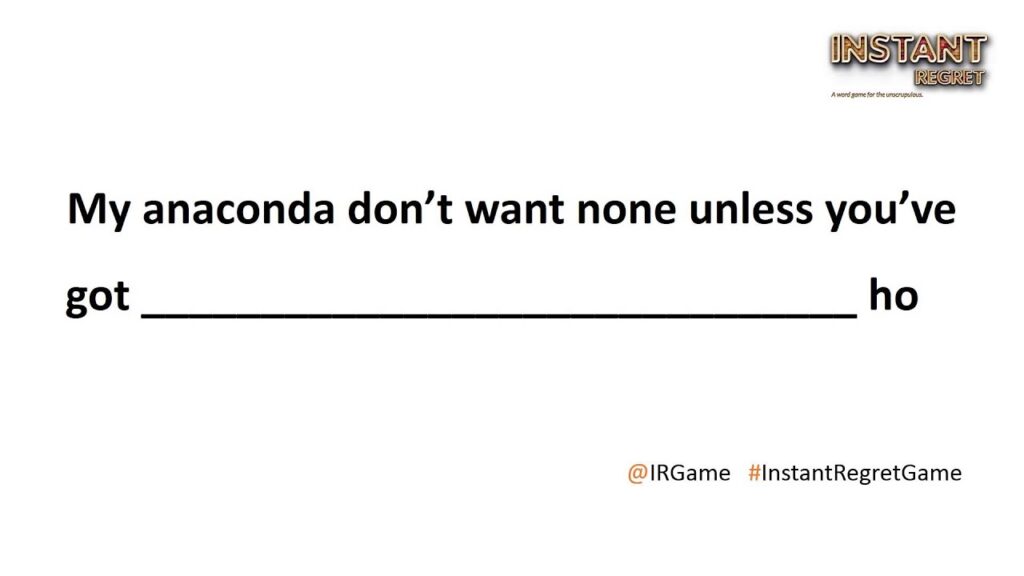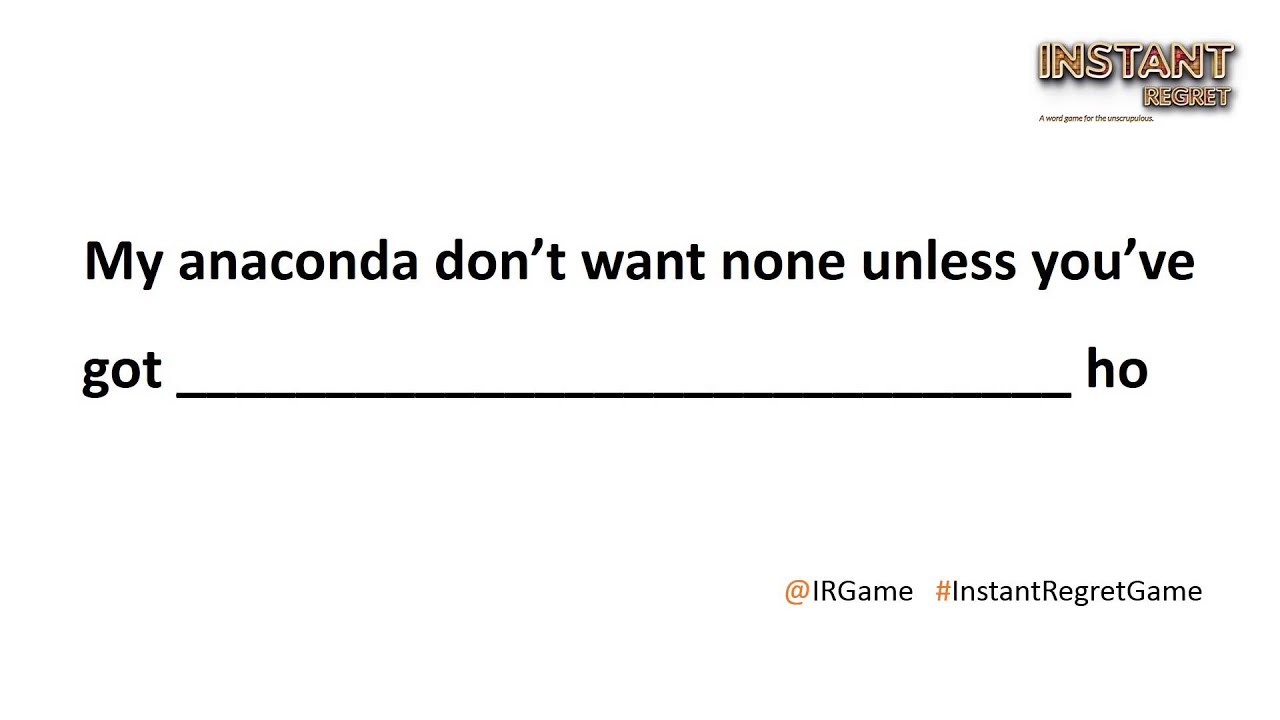
Anaconda Don’t Want None: Exploring the Truth Behind the Viral Lyric
The phrase “Anaconda don’t want none unless you got buns, hun” exploded into the cultural lexicon thanks to Nicki Minaj’s 2014 hit song, “Anaconda.” But beyond the catchy beat and provocative music video, what’s the real story behind this memorable lyric? This article delves into the meaning, impact, and lasting legacy of this iconic line, exploring its influence on music, pop culture, and even the evolving standards of beauty. When we say, “Anaconda don’t want none unless you got buns, hun,” we are talking about a cultural phenomenon.
The Origin of the Anaconda Lyric
Nicki Minaj’s “Anaconda” samples Sir Mix-a-Lot’s 1992 hit, “Baby Got Back.” While “Baby Got Back” celebrated curvy women at a time when waif-like figures dominated the media, “Anaconda” took the celebration to a new level. The lyric, “Anaconda don’t want none unless you got buns, hun,” directly addresses the preference for a specific type of physique: a full, rounded backside. This marked a shift in mainstream beauty standards, pushing for greater acceptance and appreciation of different body types. The song is very popular, and that’s why people are still saying, “Anaconda don’t want none unless you got buns, hun.”
Sir Mix-a-Lot’s Influence
Before Nicki Minaj, Sir Mix-a-Lot paved the way for body positivity in hip-hop. “Baby Got Back” challenged the prevailing beauty ideals of the early 1990s, which heavily favored thin, waifish figures. Sir Mix-a-Lot’s unapologetic appreciation for curves resonated with many who felt excluded by mainstream media. This laid the groundwork for artists like Nicki Minaj to further amplify the message of body acceptance. The cultural impact of “Baby Got Back” is undeniable, and it set the stage for “Anaconda” to make an even bigger splash.
Nicki Minaj’s Interpretation
Nicki Minaj took the theme of celebrating curves and amplified it with her signature boldness and confidence. “Anaconda” is not just about physical attraction; it’s also about female empowerment and reclaiming control over one’s sexuality. The lyric “Anaconda don’t want none unless you got buns, hun” became an anthem for women who embraced their bodies and refused to conform to societal expectations. The song’s success demonstrated that there was a significant audience eager to hear and celebrate diverse body types. It’s all about empowerment when you say, “Anaconda don’t want none unless you got buns, hun.”
The Impact on Pop Culture
“Anaconda” had a profound impact on pop culture, sparking conversations about body image, beauty standards, and female empowerment. The song’s success challenged the traditional norms of the music industry and opened doors for other artists who celebrated diversity and inclusivity. The lyric “Anaconda don’t want none unless you got buns, hun” became a cultural touchstone, referenced in memes, social media posts, and everyday conversations.
Challenging Beauty Standards
For decades, mainstream media often promoted a narrow definition of beauty, often excluding women with curvier figures. “Anaconda” directly challenged this standard by celebrating and glorifying a different body type. The song’s popularity demonstrated that audiences were hungry for more diverse representation in media. This helped to shift the conversation around beauty standards, encouraging greater acceptance and appreciation of different shapes and sizes. More and more, people are embracing the message behind, “Anaconda don’t want none unless you got buns, hun.”
Empowering Women
“Anaconda” also served as an empowering anthem for women who felt marginalized or excluded by traditional beauty standards. The song encouraged women to embrace their bodies and celebrate their individuality. The lyric “Anaconda don’t want none unless you got buns, hun” became a symbol of confidence and self-acceptance. It reminded women that their worth is not determined by their physical appearance. Many women are now empowered by the message in, “Anaconda don’t want none unless you got buns, hun.”
Analyzing the Lyrics: Beyond the Surface
While the surface meaning of “Anaconda don’t want none unless you got buns, hun” seems straightforward, there are deeper layers of interpretation. The lyric can be seen as a commentary on societal expectations, the objectification of women, and the reclaiming of female sexuality. It’s a multifaceted statement that resonates with different people in different ways.
A Commentary on Societal Expectations
The lyric can be interpreted as a critique of the societal pressure on women to conform to specific beauty standards. By explicitly stating a preference for a particular body type, Nicki Minaj highlights the absurdity of these expectations. She challenges the notion that women should strive to fit into a narrow definition of beauty and encourages them to embrace their natural features. It’s a bold statement against the constant pressure on women to alter their appearance. People are really starting to understand the societal commentary behind, “Anaconda don’t want none unless you got buns, hun.”
Reclaiming Female Sexuality
“Anaconda” can also be seen as a reclaiming of female sexuality. Nicki Minaj takes control of the narrative and dictates her own preferences. She is not passively waiting for male approval; she is actively asserting her desires. This is a powerful message of female empowerment, encouraging women to embrace their sexuality and express their desires without shame. This reclaiming of female sexuality is embodied in the phrase, “Anaconda don’t want none unless you got buns, hun.”
The Enduring Legacy of “Anaconda”
Years after its release, “Anaconda” continues to resonate with audiences around the world. The song’s impact on pop culture is undeniable, and its message of body positivity and female empowerment remains relevant today. The lyric “Anaconda don’t want none unless you got buns, hun” has become a cultural shorthand for celebrating curves and embracing individuality. The legacy of “Anaconda” is secure, and it will continue to inspire and empower women for years to come. The message of empowerment in, “Anaconda don’t want none unless you got buns, hun”, will live on.
The Song’s Continued Relevance
In a world where beauty standards are constantly evolving, “Anaconda” serves as a reminder that beauty comes in all shapes and sizes. The song’s message of self-acceptance and body positivity is as important today as it was in 2014. As long as women continue to feel pressure to conform to unrealistic beauty ideals, “Anaconda” will remain a powerful anthem of empowerment. The continued relevance of the song solidifies the importance of the message behind, “Anaconda don’t want none unless you got buns, hun.”
Inspiring Future Generations
“Anaconda” has paved the way for future generations of artists to celebrate diversity and inclusivity in their music. The song has shown that there is a significant audience eager to hear and embrace messages of body positivity and female empowerment. By challenging traditional norms and promoting a more inclusive vision of beauty, “Anaconda” has helped to create a more accepting and equitable world. The song’s influence will continue to shape the music industry and inspire future generations of artists. The impact of “Anaconda don’t want none unless you got buns, hun” will be felt for years to come.
In conclusion, the lyric “Anaconda don’t want none unless you got buns, hun” is more than just a catchy line from a popular song. It’s a cultural phenomenon that has had a profound impact on pop culture, beauty standards, and female empowerment. The song’s message of body positivity and self-acceptance remains relevant today, and its legacy will continue to inspire and empower women for years to come. The phrase, “Anaconda don’t want none unless you got buns, hun”, is a testament to the power of music to challenge norms and promote positive change.
[See also: Nicki Minaj’s Impact on Hip-Hop]
[See also: The Evolution of Beauty Standards in Music]
[See also: Songs That Empower Women]

